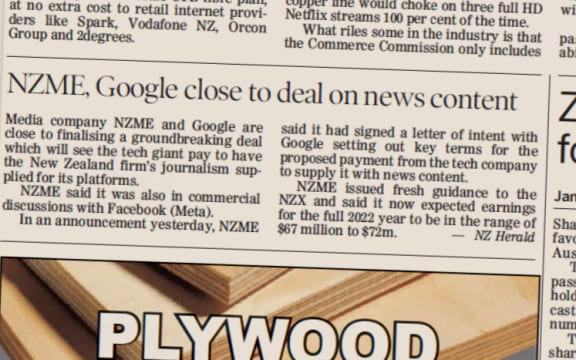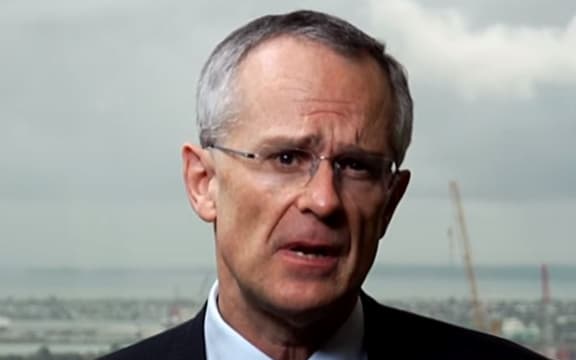By Colin Peacock, RNZ Mediawatch presenter
There is mounting pressure on tech titans Google and Facebook to pay local news media to carry their news online.
Google has already done deals with some for its News Showcase, but other big names in news are still trying to get the platforms to pay — and the government is hinting it could force the issue soon.
“Are you putting the hard word on them to secure deals to pay for content? Are you going to legislate?” Newshub Nation host Simon Shepherd asked Willie Jackson last weekend, putting the hard word on the broadcasting and media minister.
“Are you putting the hard word on them to secure deals to pay for content? Are you going to legislate?” Newshub Nation host Simon Shepherd asked Willie Jackson a week ago, putting the hard word on the broadcasting and media minister.
“I’m trying really hard. I have said to them, [in] three months let’s see the deals in the marketplace,” the minister replied.
For years local news media have griped about getting very little from the platforms distributing their stuff to huge audiences — and profiting from it.
The thing most likely to persuade the tech titans to pay local newsmakers is the likelihood of the government forcing the issue with legislation — and this was the first time that a government minister had set any kind of deadline publicly.
‘I want to see fairness’
“I want to see some fairness. I want to see all these Kiwi news organisations looked after . . and these big players have the funding and the resourcing to be able to do that,” Willie Jackson told Newshub Nation.
Some of the deals that have been done were revealed earlier this month when Google launched the local version of its News Showcase service, now available via Google’s websites and apps.
The first Kiwi outlets ever to get regular payments from Google for that include The New Zealand Herald’s owner NZME and its subscriber subsidiary BusinessDesk, RNZ, online sites Scoop and Newsroom and the Pacific Media Network. There is also a handful of local outlets too like Crux, which serves the Southern Lakes region, and Kapiti News.
“It’s part of our commitment to continuing to play a part in what we see as a very important shared responsibility to ensure the long term sustainability of public interest journalism in New Zealand,” Google’s local country representative Carolyn Rainsford told RNZ’s Gyles Beckford recently.
Broadcasting Minister Willie Jackson described that as “a good start, but not enough” — while the Spinoff’s founder Duncan Grieve was also underwhelmed.
He reckoned it was actually Willie Jackson that Google had in mind with the Showcase launch “to create a sense that Google is now a solid and public spirited ally to the news industry”.

For now, Google News Showcase is far from a comprehensive or compelling service for Kiwis. It offers nothing from our biggest national news producer Stuff or other big names in news like TVNZ and Newshub — or smaller outlets such Allied Press and The Spinoff.
Bargaining collectively
Several publishers — including Stuff — have banded together with the News Publishers Association to bargain collectively with Google and Meta (the parent company of Facebook).
Earlier this year the Commerce Commission gave them permission to negotiate a deal for a 10-year period.
So how’s that going?
“We can’t comment much on the status, but we are engaging with the NPA,” was all Google’s regional head of partnerships Shilpa Jhunjhunwala would tell RNZ earlier this month.
A recent report by the Judith Nielsen Institute estimate Google and Facebook paid Australian media companies about A$200m last year.
“Unfortunately an interview won’t be possible,” Google New Zealand told Mediawatch last week (without explaining why).
Instead they gave us a statement attributable to Caroline Rainsford, country director Google New Zealand:
“We are proud of the launch of Google News Showcase and continuing our conversations with other local news media businesses.”
“We can’t give you any kind of commercial numbers because they’re all commercial and in confidence,” Google’s regional head of partnerships Shilpa Jhunjhunwala told RNZ’s Gyles Beckford earlier this month.
When pressed, she said Google’s global commitment to News Showcase was $1 billion over three years.
“But beyond that, we’re not able to share anything specific to New Zealand,” she said.
Why is there no deal with other New Zealand news publishers yet?
‘No serious offers on table’
“Those negotiations are underway, but neither of those companies have put any serious offers on the table,” Stuff chief executive Sinead Boucher told Mediawatch.
She said the Australian deals were their benchmark.
“What we produce is very similar kind of content and we operate in very similar markets. We’d be looking for payments that equate to more like NZ$40 million to $50 million a year into the industry here,” she said.
“I think the government and Minister Jackson have made clear that the government expect fair deals to be done — and that they are prepared to legislate in the near term to ensure that happens,” she said.
“The only way to materially address this is to create an environment where we can negotiate fair commercial payment from these giant multinationals who have built their businesses entirely off content created by other people,” she said.
“You could think of any search term and put it into Google and look down the results and see that a new story created by somebody is part of the results. What we are focused on negotiating a commercial payment for that content in the same way that you would for any other product,” she said.
“If you invested in a car and someone started running it as a taxi, you would expect them to compensate you for that — not to build their own business without recognising your investment,” Boucher told Mediawatch.
“Our problem is that these platforms are very reluctant to come to the table and have a fair negotiation. That’s why the sort of legislation has been needed in Australia and other countries and also here in New Zealand,” she said.
The tale across the Tasman.

The man who forced the platforms to pay up
Rod Sims has been called “the man who forced Google and Meta to pay for news.”
For more than a decade, he chaired the Australian Competition and Consumer Commission (ACCC) Australia’s competition regulator.
“It was fraught at times, but we presented the report to government in mid-2019 and they accepted the recommendation to have a News Media Bargaining Code six months later. It was legislated in February 2021. That’s pretty quick in terms of policy development in Australia,” Sims told Mediawatch.
“Google’s done a deal with essentially all media businesses. Meta has only done a deal with media businesses which that employ 85 percent of (Australia’s) journalists. It’s crucial that . . . it’s widely shared and you need legislation so that everybody has the ability to bargain.
“I know for a fact that the payments were well in excess of A$200 million — so NZ $40 million to $50 million sounds absolutely the right number to be spread across all media,” he said.
“Google and Meta were required to bargain with all eligible media businesses — and if they could not reach agreement, then arbitration would come into place. The threat of that evened up the bargaining power,” he said.
“The second component was that if Google and Meta did a deal with one media player, then they were required under law to do a deal with all media players. So their choice was either have no media content on their platform, or do deals,” he said.
“They chose to do deals with media companies because there’s value to them,” he said.
Arbitration threat needed
“I’m a bit concerned that in New Zealand you don’t have arbitration at the end of the negotiation period negotiations fail,” he said.
A Google officer once told me struggling news media pleading for “compensation” were like redundant drivers of horse-drawn carriages and rickshaws expecting today’s taxi drivers to pay them.
“No, that’s completely wrong. This is not like the car taking the place of the horse and carriage or smartphones taking the place of Kodak film because Google and Facebook don’t produce any journalism. So they haven’t taken the place of media, because they’re just not in the media business,” Rod Sims told Mediawatch.
“For Google to be a good search engine, it needs to bring in media into its search just about every time. But they don’t need any particular media company. So only by the News Media Bargaining Code could you even up the bargaining power,” he said.
“Unless we get payment for media that’s being taken and used for free, we’ll have a lot less media and less media harms society,” he said.
“It’s not up to me to tell the New Zealand government what to do, but my advice would be to pass the Australian News Media Bargaining Code,” he said.
This article is republished under a community partnership agreement with RNZ.
This content originally appeared on Asia Pacific Report and was authored by Pacific Media Watch.
Pacific Media Watch | Radio Free (2022-09-19T01:13:22+00:00) Global tech titans under growing NZ pressure to pay for news. Retrieved from https://www.radiofree.org/2022/09/19/global-tech-titans-under-growing-nz-pressure-to-pay-for-news/
Please log in to upload a file.
There are no updates yet.
Click the Upload button above to add an update.